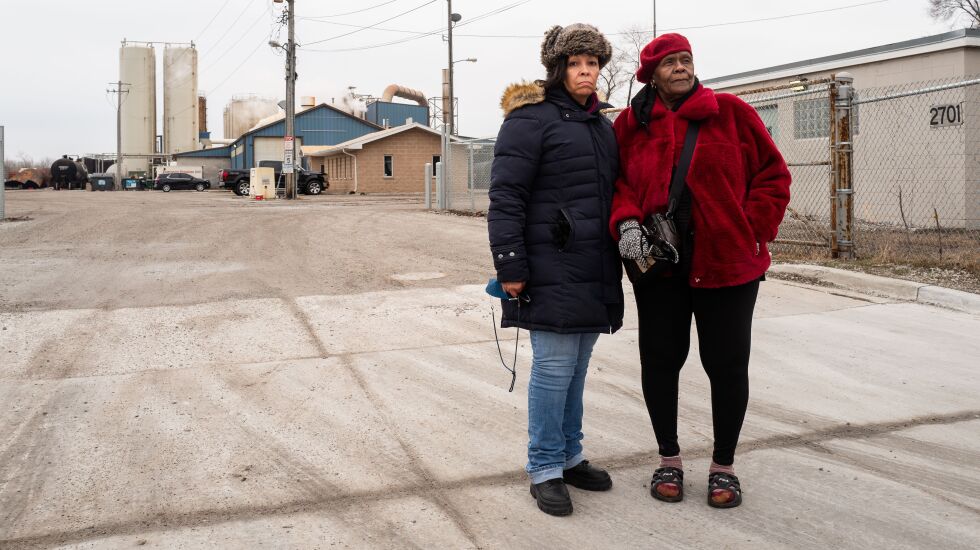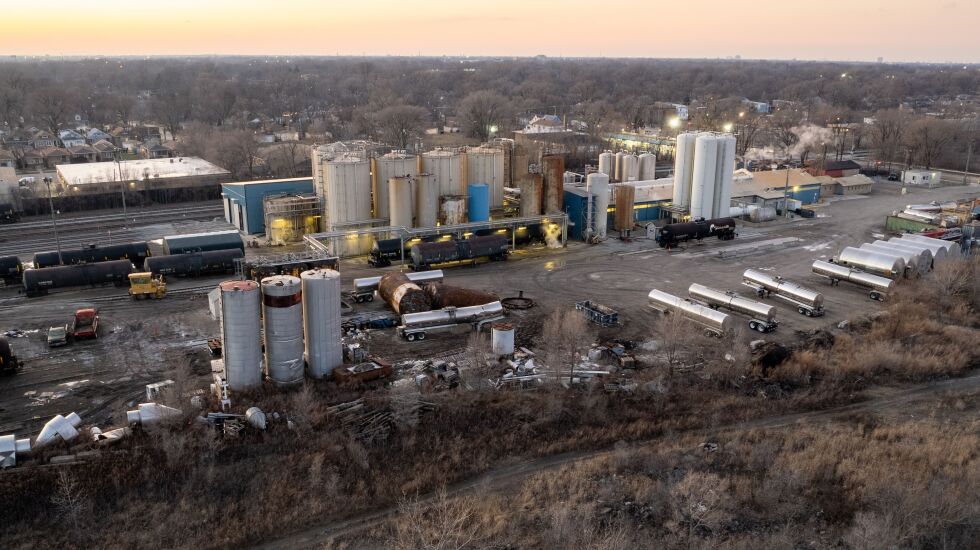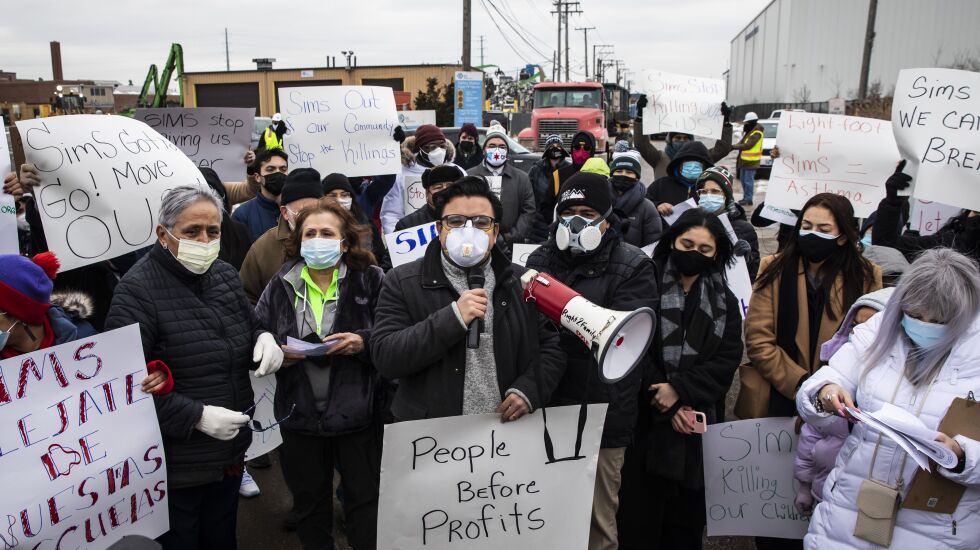
Anna Johnson used to garden in the backyard of her South Deering home.
But smells from a nearby plant at 100th and Torrence that processes vegetable oil for ingredients in animal feed overpower her.
“It burns my nose, it burns my eyes,” says Johnson, who describes the stench as something akin to feces or a rotting corpse.
Other neighbors say the odor from Pullman Innovations is like the smell of rotten eggs.
After getting complaints from people who live nearby, city inspectors came out, and the health department slapped the business with more than a dozen tickets in 2020 that accused it of polluting the air and being a nuisance.
Almost two years later, Pullman agreed to pay $12,000 in fines without admitting doing anything wrong in terms of air pollution.
The fines came to less than one-third of what the company would have faced if those pollution violations stuck. City Hall didn’t require the company to do anything to control the odors.
“People feel defeated,” Marie Collins-Wright, Johnson’s friend and neighbor, says of the outcome.
The Pullman case isn’t unusual. Chicago businesses cited by city inspectors for air pollution sometimes spend a year or longer going through City Hall’s administrative process, in the end seeing the air pollution citations dropped and the fines reduced, records examined by the Chicago Sun-Times show. In some cases, the businesses end up also being given a pass on additional tickets for new violations as they negotiate with Chicago officials.
Among the companies in recent years to successfully get the city to drop air pollution citations include scrap-metal operations Sims Metal Management in Pilsen, General Iron, which operated for decades in Lincoln Park, and Reliable Asphalt in Austin.
MAT Asphalt in McKinley Park fought air pollution charges in city administrative hearings, lost its case and is now appealing in state court.
From 2018 through 2022, there were 69 air pollution citations issued by the city’s public health department. Of that number, 39 were dropped, and 29 were found to be “liable,” mostly after pleas of admission from the businesses. One case, another ticket for MAT, is pending.
A number of the businesses cited are in low-income communities of color and near other industrial operations. These plants historically have operated in the same parts of the city. Mayor Lori Lightfoot has said she’ll address pollution plaguing these neighborhoods.
“Lax enforcement and low penalties have been and continue to be a key part of how polluters escape responsibility for dirtying the air in Chicago’s low-income communities of color,” says Meleah Geertsma, a senior attorney with the Natural Resources Defense Council, an advocacy group.
The air pollution data and records were compiled by Anthony Moser, a member of the McKinley Park organization Neighbors for Environmental Justice.
The Sun-Times’ examination focused on the city’s primary air pollution law, which previously carried a fine of up to $5,000 for each violation. In January 2021, the Chicago City Council substantially increased the potential penalties, doubling the maximum for a first offense and allowing for fines up to $20,000 for subsequent violations. If City Hall finds the violation particularly egregious, the fine could be as high as $50,000.
Asked about the data, city health officials say that, even though tickets for multiple violations are often given to businesses, those accusations sometimes overlap. They say that’s why City Hall sometimes agrees to let a business admit responsibility for a nuisance violation and drop air pollution citations.
“Where it might appear that [the health department] chose to knock down or drop tickets, this was in fact a determination that the counts were duplicative and based on the same underlying incident,” the city health department says in a written statement. “We could not pursue separate penalties for each violation.”
City inspectors often are called out to sites for businesses that already have unresolved tickets. While inspectors flag new problems, they also have noted in dozens of instances in recent years that “enforcement action is already pending for these issues,” records show.
An inspector’s concerns don’t always result in a ticket.
Days after the February 2022 settlement with Pullman Innovations, a city inspector was back at the plant, again investigating complaints of foul odors — and agreed.
“Strong odors of sour, rotten eggs, similar to a vomit odor, was observed,” the inspector wrote in a report. “This odor was very uncomfortable to inhale as it instantly made me nauseous and made me want to vomit.”
But the inspector didn’t write a ticket for that. Last month, the company pleaded “liable” to another pollution citation issued last year.
Neighbors say they don’t understand why the city doesn’t go after Pullman Innovations harder.
Mike Oganovich thought the plant’s change in ownership in 2016 would make a difference. The previous owner, Agri-Fine, had racked up multiple violations and was sued by then-Illinois Attorney General Lisa Madigan.
“We’ve been fighting them for many years,” Oganovich says. “We’re part of the city that’s forgotten.”

Bob Foster, managing director of Pullman Global, says some odor controls have been put in place and more are coming.
Pullman Innovations — owned by a group of investors that includes the Dutch Farms family — acquired the plant from Agri-Fine in 2016, saying it would be less of a nuisance to its Southeast Side neighbors. The plant produces an ingredient used for chicken feed at farms sourced for Dutch Farms eggs.
Foster says the owners are “committed to do the right thing for the neighborhood.”
City officials say: “Whether corrective actions are required by settlement or taken as voluntary steps, [the health department] is working with companies all the time to get them to make improvements that address pollution and quality-of-life issues.”
Sims, 2500 S. Paulina Ave., is another company that has run afoul of city pollution rules as well as state and federal environmental laws. In 2021, Sims settled 15 citations for 30 violations issued the prior year, paying $18,000 while admitting no wrongdoing. Nine counts of air pollution were dropped as part of that deal, which included no written requirements for any corrective measures.
“While Sims disagreed with the citations, the matter was resolved responsibly,” the company says.
It says it has adopted new dust controls. Separately, the U.S. Environmental Protection Agency has required the business to install air pollution monitors.
Still, Theresa McNamara, chairwoman of the Southwest Environmental Alliance, criticizes the city’s approach with Sims, saying: “The city seems to look the other way. It’s the same old, same old.”
For Sims, having no city pollution violations on its record is important. The company is in the process of seeking a new operating permit, and compliance with the law is one of the things that can be taken into account.

One of the worst environmental debacles of the past five years, the implosion of the Crawford coal plant in Little Village, resulted in no citations for air pollution. Instead, developer Hilco and two contractors paid a combined $68,000 and admitted no wrongdoing in a settlement with the city. Hilco officials didn’t respond to a request for comment.
The botched Hilco implosion was the impetus for the tougher air pollution fines the Chicago City Council approved in 2021.
City officials cited Hilco and the contractors for violations including improper handling of materials, construction site cleanliness and nuisance but not air pollution even though the implosion smothered much of Little Village in dust.
Before General Iron closed its longtime Lincoln Park operation at the end of 2020, the company paid $18,000 to settle 20 tickets for almost three dozen violations that included a dozen air pollution charges.
The tickets were issued from December 2019 to May 2020, as the company prepared to move its operations to the Southeast Side.
Owner Reserve Management Group, which bought General Iron in 2019 with the intent of moving it to the Southeast Side, won’t comment.
Reliable Asphalt settled a pair of air pollution citations and other charges, paying the city $15,000 in 2019. Reliable said it had made improvements to its site, and city officials agreed that the company wouldn’t have to admit it did anything wrong.
Reliable representatives won’t comment.
Other companies — including Meyer Industrial Container in Auburn Gresham and Wheatland Tube Co. in New City — are among dozens of businesses that have seen air pollution citations dropped without entering into a formal settlement with the city. Calls to those businesses for comment weren’t returned.
Rather than try to reach an agreement with City Hall, MAT Asphalt fought and lost its case in administrative hearings in 2021. The company has filed suit in Cook County circuit court to try to get that decision overturned.
A lawyer for the business won’t comment.
Collins-Wright says City Hall’s actions in case after case amount to rubberstamping agreements the polluters want.
“The corporations have their lawyers in there,” she says. “And the city doesn’t want to spend money on fighting.”
Brett Chase’s reporting on the environment and public health is made possible by a grant from The Chicago Community Trust.







